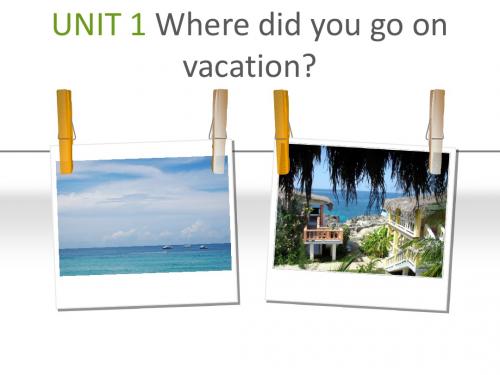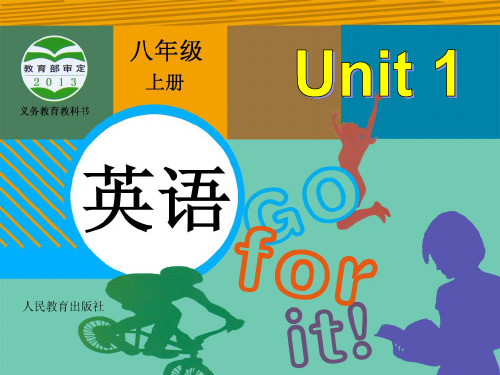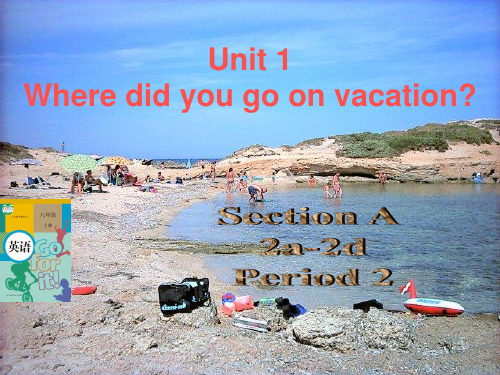unit 1 where did you go on vacation?SectionA
2013秋季UNIT 1 Where did you go on vacation Section A精备

It was interesting.
Where did he/she/they go on vacation? How was it (going) ?
They went to fat summer camp. It was hard but interesting.
awesome not bad wonderful just so so excellent amazing 1. Tina 2. Bob 3. Sally 4. Xiang Hua 5. Tom interesting great relaxing exciting
boring bad awful terrible
Play
√ √ √ √ √ √
No, I didn’t.
√ √
√
不Hale Waihona Puke 代词anyone anything anybody everyone everything everybody no one nothing nobody someone something somebody
Indefinite pronouns
UNIT 1 Where did you go on vacation?
I had a great vacation I’d like to share some photos with you
past tense Where What
When? How?
What did I eat?
What What Who did I go with?
1. Tina 2. Bob 3. Sally 5. Tom 4. Xiang Hua The girl/ boy ( who went to the mountains ) is Tina. The boy ( who went to New York City ) is Xiang Hua. The girl ( who stayed at home ) is Sally. The boy ( who visited his uncle ) is Bob. The boy ( who went to summer camp) is Tom.
八上Unit 1Where did you go on vacation Section A 练习2

Unit 1Where did you go on vacation?Section A (2a-2d)课时练习Ⅰ.根据句意及汉语提示写出所缺的单词1.This is a (精彩的) movie and I want to watch it again.2.(大多数) of the students in my class are from China.3.(任何人) here will tell you where the bus stop is.4.The work is so difficult that (很少) people can do it.5.I can’t find my keys (在任何地方).Ⅱ.用所给单词的适当形式填空6.We (take) many photos near the river last Sunday.7.—Hi, Jane.What did you do yesterday evening?—I (study) for a test.8.—Do you like the story?—Yes, I do.I think it is very (interest).9.I (real) need your help, Lisa.10.I went to the beach(relax) with my friends last Sunday.Ⅲ.根据汉语意思完成句子11.“你去夏令营了吗?”“不,我没有去。
”—Did you go to ?—No, .12.朱莉去哪儿度假了?Where Julie ?13.昨天晚上我和我姐姐一起出去了。
I with my sister last night.14.我去商店买了一些有趣的东西。
I went to the store and .15.我喜欢去图书馆,因为那里有相当多的书。
I like to go to the library, because there are books there.Ⅳ.完形填空Last Saturday, our class had a trip. We wanted to do something 16. So, we decided to go to the 17near our city.That day, the weather was great, 18but not hot. We started at eight. On the way, we talked and sang. Soon, we 19. Wow! It was really a wonderful mountain. I couldn’t wait to 20to the top. I wondered what the top was like. About an hour later, I 21to have a rest(休息). I looked back. Oh, my friend Alice was about 100 meters behind me. She 22to be very tired. I waited for her and asked her to follow me. At about eleven, we got to the 23. On it, we ate some food and drank some water. I felt the food was never 24like that.There I 25something for my sister but nothing for myself in the gift shop. In the evening I wrote a diary about the trip.()16.A.boring B.exciting C.popular D.slow()17.A.mountain B.museum C.park D.village()18.A.windy B.sunny C.rainy D.cloudy()19.A.left B.lost C.arrived D.followed()20.A.drive B.jump C.ride D.climb()21.A.stopped B.learned C.thought D.finished()22.A.wanted B.seemed C.needed D.found()23.A.tree B.building C.top D.shop()24.A.delicious B.terrible C.cheap D.expensive()25.A.bought B.visited C.shouted D.practicedⅤ.阅读理解A few good friends are talking about their last vacations.Helen I went to Xi’an with my cousin. We visited the Terracotta Army and had a great time. We ate delicious food, too. Xi’an is a big and nice city. I like it a lot.Jason My parents took me to Hong Kong by plane. We went to Disneyland. It’s just like a fairy tale kingdom(童话王国). And we bought many special things. Most of them weren’t expensive at all.Diana Last summer, my family went to Hainan. The weather was sunny and hot. We wentswimming and boating. They were exciting. Later, we ate some seafood. It was very delicious! Bruce My uncle works in Tibet(西藏).Last summer, I took a train to visit him. There I saw lots of high and clean mountains. Many people there are good at singing and dancing.()26.What did Jason do on vacation?A.He ate delicious food.B.He went shopping.C.He went boating.D.He saw some mountains.()27.Who had a great time at the sea?A.Helen.B.Jason.C.Diana.D.Bruce.()28.Who is good at dancing and singing?A.People in Xi’an.B.People in Hong Kong.C.People in Hainan.D.People in Tibet.()29.How did all the friends feel about their vacations?A.Sad.B.Bored.C.Terrible.D.Happy.()30.Which of the following is TRUE?A.Helen went to Xi’an by plane.B.Jason liked boating on the sea.C.Diana visited Disneyland.D.Bruce visited his uncle in Tibet.Ⅵ.单词拼写根据下列短文,写出与各小题所给汉语相对应的英语单词的正确形式(每空一词)。
2015八年级英语上 Unit 1 Where did you go on vacation Section B

1. He____(be, was, were, been) here a moment ago. 2. They ____(be, was, were, been) here just now. 3. The scientists _____(leave, leaves, leaved, left) for America yesterday. 4. Last week we ______(visit, visited ) the Science Museum. 5. When I was a child, I often ____(play, played) football. 6. The students ran out of the classroom as soon as the bell ____(ring, rang, rung).
1b
words andபைடு நூலகம்
words.
words
words
delicious terrible cheap expensive exciting boring
1C . LISTEN . LISA IS TALKING ABUT HER VACATION. ANSWER THE QUESTIONS. 1.Where did Lisa go on vacation? She went to Hong Kong. 2.Did she do anything special there? What was it? Yes, she did. It was a fun park 3. Did she buy anything for her best friend? Yes ,she did. 4. Did Lisa like her vacation? Yes ,she did.
Unit 1 Where did you go on vacation Section B 2

Read Jane’s diary entries carefully.
Fill in the blanks.
sunny and hot
rainy
her father
tried paragliding
yellow noodles
Enjoyable
the bad weather Terrible
Read Jane’s second diary and write “T” or “F”.
We _w__a_it_e_d__ a long time for the train and we were __w__e_t and cold because we forgot to bring an _u_m__b_r_e_ll_a__. Anna: Oh, no! Jane: And that’s not all! We also didn’t bring _e_n_o_u_g_h____ money, so we only had one bowl of rice and some fish.
Useful phrases and sentences
到达
try doing sth. feel like 给……的感觉;感受到
F 5. The food tasted bgorreaintg.
2c Read Jane’s diary entries again. Fill in the chart.
Things Jane did Did she like it? Why or why not?
or saw
(Yes/No)
read a diary, focusing on the four wh-questions helps a
八年级上Unit1 Where did you go on vacation Section A

camped by the lake
went to the library
studied for the math test practiced the piano
You are a boy . These are some of
your photos , ask and answer Jim
-- What did you do last weekend, Jim?
Saturday.1
-- Well, on Saturday morning, I played …ba.sketball
On Sunday morning I …cl.eaned my room
去参加夏令营 go to summer camp
1.Where did you go on vacation?你去哪里度假了? 1)疑问副词where引导的特殊疑问句,where用来询 问地点和场所,放在句首,其后跟一般疑问句。
a. W__h_e_r_e do you _co_m__e_ _f_r_o_m__?你从哪里来? b.W__h_e_re_does he_l_iv_e___?他住在哪里? 2)go on vacation意为“去度假”。去海南度假。
You are a girl . These are some of Saturday your photos , ask and answer
went to the park Sang and played the guitar had a dinner with…
WLuchya’stwdeiedkeyndouw/ashgreeadt.oOonnSaStuartduarydmaoyr/nSinugn,sdhea…y?
人教新目标八年级上册Unit 1 Where did you go on vacation Section B 3a-3c Writing公开课课件

人称:日记要用第一人称写。
Brainstorm: 假设你暑假或上周末去旅游了。请 根据你的旅行经历写一篇文章。内容包括:
• 1. 你是什么时候到什么地方去参观旅游的? • 2. 你和谁一起去的?当时的天气怎么样? • 3. 你们在不同时段分别开展了哪些活动?(至少写两个时段和两个活动) • 4. 你的感受如何?
Where did you go on vacation?
第八课时, Writing
Tian'anmen Square
The Palace Museum a Beijing hutong
Did you go to Beijing on vacation?
I went to Beijing on vacation with my family in 2012.
思路点拨
:运用and, or, so, first, then, next, although...等连词将以上要点连成文章。
作业
请将该作文写在作业本上。
(活动可以用本节课提到的,也可以根据你的实际 情况写或自己编造)
参考句型: 1. I had a good time in ... last summer vacation. 2. I'll never forget the timetransportation
places of interest
TrTraavvel el
place activity
food
people
思路点拨
第一人称 I
审题:人称__________ 时态
八年级上册英语unit1Where did you go on vacation Section A课件
everything是用于指代事物的复合不定
与之相对应的复合不定代词 anyone, so nobody 和 everybody) 用于指人。
no one 和everyone ( anybody, somebod
4. We took quite a few photos there.
此句中 quite a few 是一个整体结构,表
stayed at home special last month. He just ______________
___________ photos there. Rick didn’t do __ quite a few a the time to read and relax.
Boy: Oh, really? Did you go with an
Grace: Yes, I did. I went with my mo
2a,2b
Tapescript
Boy: Did you go to Central Park? Grace: Yes, I did. It really nice. Boy: Did you buy anything special? Boy: Oh, really? What? Grace: I bought him a hat.
People
1. Grace c
Places
a. beach
b. home c. New York City
a 2. Kevin ____ b 3. Julie ____
2a,2b Tapescript
Conversation 1 Grace: I went to New York City.
Boy: Where did you go on vacation
2015-2016学年八年级英语上册 Unit 1 Where did you go on vacation(第1课时)Section A(1a-1c)课件
三、句型转换。
11.I was in the teacher's office just now.(改为一般疑问句,并作否定回 答) Were________ you —________ in the teacher's office just now? —________ No ,I ________. wasn't 12.I read my books last night.(改为一般疑问句) ________ you ________ Did read your books last night?
4.重要短语
stay at home 待在家里 go to the beach 到沙滩去
go to summer camp 参加夏令营
go to the mountains 去大山里 visit museums 参观博物馆
一、单项选择。
C 1.His family ________ the zoo last week. A.visit B B B.am visiting C.visited D.will visit 2.Where ________ you go on vacation? A.does B.did C.are D.were 3.She didn't ________ me about it.
英语。
2.camp的用法: (1)n.野营,营地
eg:a summer camp 一个夏令营
(2)v.宿营 eg:go camping 去宿营
3.Where did„?
“Where did„?”是一般过去时的特殊疑问句,did是助动词,在一
般过去时的句子中,在主语之前加did可构成疑问句,在主语之后,动词 之前加didn't可构成否定句,此时谓语动词用原形。
八年级英语上册 Unit 1 Where did you go on vacation Section A(1a-1c)
任务二:根据图片A,完成下面的对话。
—Where did Sally and Bob go on vacation?
—They went to the mountains
.
任务三:利用其余三幅图片,仿照上面的对话,编写类似的对话。
略
Where did you go on va为实义动词,其句 式结构为:特殊疑问词+did +主语+实义动词原形+...?如:
Where did your parents go last weekend? 上周末你父母去哪儿了?
What did you see in the museum? 在博物馆你看见了什么? 拓展 当特殊疑问词做主语时,句式结构为:特殊疑问词+谓语+其 他成分?如:
Who went to the park? 谁去公园了? 温馨提示:助动词did后面的实义动词一定要用原形。
Unit 1 Where did you go on vacation?
Section A (1a-1c)
任务一:给下列短语选择正确的图片。 1.went to the beach( D ) 2.went to summer camp( C ) 3.went to the mountains( A ) 4.stayed at home( B )
课堂教学流程完美展示 全书优质试题随意编辑 独家研发错题组卷系统
2013年八年级英语上册 Unit 1 Where did you go on vacation Section B 1a-2e
were- are
Phrases (短语):
1.want to do sth.=would like to do sth. 想要做某事
2. start doing/to do sth. 开始做某事 3.wait for
Hale Waihona Puke 等待,等候4.because of 因为,由于
Language points. 7. What a difference a day makes! 一天的差异是多么大呀! difference 可数名词,意为“差别,差异”,其 形容词形式为different,意为“不同的,有差 异的”。 e.g. What is the difference between this book and that book? 这本书和那本书之间的区别是什么? My schoolbag is different from yours. 我的书包和你的不同。
Language points.
4. exciting形容词,意为“令人兴奋的,使人激动的”。 通常用来形容事物。 e.g. That basketball game was very exciting. 那场篮球赛让人感到非常兴奋。 excited形容词,意为“感到兴奋的,激动的”。通常 用 来形容人。 e.g. Mark was excited to see the basketball player. 马克看到那个篮球运动员很激动。 The exciting news made us excited. 这个振奋人心的消息让我们感到很兴奋。
Unit 1 Where did you go on vacation?
Section B 2a-2b
9. wait for意为“等候”,其后可接人或物。 e.g. Tom is waiting for a bus over there. 汤姆正在那里等公共汽车。 I’ll wait for you at the door. 我将在门口等你。
